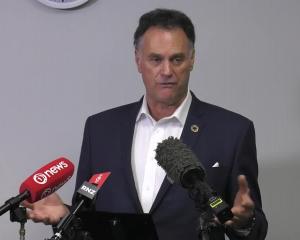
Queenstown’s mayor is on board with tourism growth but concerned it may affect ratepayers. PHOTO: GETTY IMAGES
He has pointed to the government's city and regional deals policy as a way of ensuring support.
Responding to comments by the new Economic Growth Minister, Nicola Willis, on boosting tourism, Queenstown Lakes District Mayor Glyn Lewers said visitor numbers in the area were already high, but tourism's social licence had taken a hit with locals.
"I would expect a very serious investment in actually accommodating those visitors because a small ratepayer base cannot sustainably keep supporting the tourism industry," he said.
Speaking after his State of the Nation speech in Auckland, Mr Luxon told reporters it would not be a case of history repeating itself.

Prime Minister Christopher Luxon.
"We are not going to apologise because this country desperately needs growth.
"We're powering up our sectors to say `yes', because actually that's the stuff that people actually want to know. Go talk to some of the businesses as I have in Queenstown about what's it been like when we've had suppressed tourism numbers.
"We were slow coming out of the gates, we lost a lot of our wholesale relationships in tourism. I want that turned on big-time internationally and I want to be able to welcome visitors here.
"We can manage value and volume, we can manage regional dispersal and we can manage seasonality and I think we can manage that really well."
There was also a roading package for Queenstown and other investment into South Island infrastructure, Mr Luxon said.
"But the bigger opportunity is actually what we call the city and regional deals and actually as the councils, particularly they're working often with their adjacent councils ... we're expecting them to say what do they think are the most pressing things that over the next 10 years actually would enable this region to grow faster.
"For a place like Queenstown, I get it. There's been challenges in the past around accommodation for workers, there's roading and infrastructure challenges as a result, but what we need is actually central and local government to work together in a partnership through the construct of a city or a regional deal."
The regions are not convinced that promoting higher numbers of tourists is the answer.
Mr Lewers and his Waitaki district counterpart Gary Kircher are asking what it really means for the regions.
Prior to Mr Luxon's comments, Mr Lewers said they were already delivering on minister Willis's goal.
"When I first started as the mayor, I think it was one resident night to every 30 visitor nights. It is now one to 47," he said.
"We support a big chunk of the visitor economy, the actual residents and the ratepayers here."
He was on board with more growth, but said tourism's social licence had taken a hit with the locals, and they needed support to pay for roads and pipes to cope with additional visitors and avoid burdening ratepayers with the costs.
"If that is to increase, I would expect a very serious investment in actually accommodating those visitors because a small ratepayer base can not sustainably keep supporting the tourism industry, especially when those GST receipts or the economic, financial growth that we create is sent up to Wellington," he said.
Mr Kircher said the focus should be on getting tourists already visiting New Zealand to extend their stay for more quality spend, as opposed to solely trying boost the numbers coming in.
"Is it just focusing on marketing overseas or is it actually looking at how they can add value to a lot of what we've already got here in New Zealand?
"It's really important for places like ours that people have time to get to and spend some time in the Waitaki district," Mr Kircher said.
Waitaki's tourism drawcards, such as the Whitestone Geopark, Alps 2 Ocean Cycle Trail and Oamaru's Victorian Heritage Precinct, did not generate tourism income directly, making slow tourism more valuable to the district, he said.
"They benefit the accommodation providers, tour operators, the bus companies and so on.
"But how does it actually come back to help pay for some of the key infrastructure that councils provide?"
The council needed to improve infrastructure used by tourists without further burdening the ratepayers, he said.
How the district would benefit from the new overseas visitor levy on that front was unknown.
"Discussions we've had with the government have been around the visitor levy and how it can be shared more equitably." - RNZ/Additional reporting APL












